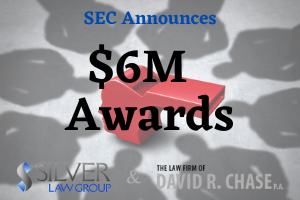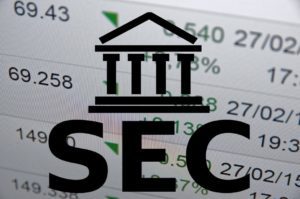 In a recent press release, the US Securities & Exchange Commission (SEC) announced the award of more than $6M in bounties in two separate orders. Both orders involve providing information to the SEC for two covered actions.
In a recent press release, the US Securities & Exchange Commission (SEC) announced the award of more than $6M in bounties in two separate orders. Both orders involve providing information to the SEC for two covered actions.
In the first order, the whistleblower was described as an “outside professional” who was the target of a product solicitation. Believing the product to be misrepresented, the individual contacted SEC staff to notify them of the activity. SEC staff opened an investigation, and the individual offered original information and continual assistance that led to a successful enforcement action. The Claims Review Staff (CRS) awarded this whistleblower “more than $3 million.” Continue reading
 SEC Whistleblower Lawyer Blog
SEC Whistleblower Lawyer Blog


 Corporate regulations are nothing new. After the stock market crashed in 1929, plunging the U.S. into the Great Depression, federal regulation of corporate disclosures began. With the passage of the
Corporate regulations are nothing new. After the stock market crashed in 1929, plunging the U.S. into the Great Depression, federal regulation of corporate disclosures began. With the passage of the  As Special Purpose Acquisition Companies (SPACs) have become increasingly popular were being featured in the news, in recent months, there have been high-profile cases of fraud that have been equally noteworthy. And looking at a few of these is useful for those becoming SPAC whistleblowers—to understand the legal issues some SPACs are facing….
As Special Purpose Acquisition Companies (SPACs) have become increasingly popular were being featured in the news, in recent months, there have been high-profile cases of fraud that have been equally noteworthy. And looking at a few of these is useful for those becoming SPAC whistleblowers—to understand the legal issues some SPACs are facing….  Some investors are increasingly opting to put their money in Special Purpose Acquisition Companies (SPACs) rather than Initial Public Offerings (IPOs). But some of the very same reasons why SPACs are comparatively more attractive may also be
Some investors are increasingly opting to put their money in Special Purpose Acquisition Companies (SPACs) rather than Initial Public Offerings (IPOs). But some of the very same reasons why SPACs are comparatively more attractive may also be  While Special Purpose Acquisition Companies (SPACs) SPACs—shell companies created for the sole purpose of funding the future acquisition of another company—have existed since the 1990s,
While Special Purpose Acquisition Companies (SPACs) SPACs—shell companies created for the sole purpose of funding the future acquisition of another company—have existed since the 1990s,  Leaders of the Securities and Exchange Commission (SEC)
Leaders of the Securities and Exchange Commission (SEC)  Most employees aren’t surprised when they’re asked to sign a non-disclosure agreement (NDA) as a condition of employment. It’s one way to warn and penalize employees about telling company secrets. But when the NDA prohibits an employee from becoming a whistleblower, the SEC steps in.
Most employees aren’t surprised when they’re asked to sign a non-disclosure agreement (NDA) as a condition of employment. It’s one way to warn and penalize employees about telling company secrets. But when the NDA prohibits an employee from becoming a whistleblower, the SEC steps in.  As volatile as the market is these days, clients still should not lose sight of the
As volatile as the market is these days, clients still should not lose sight of the  Compared to the decades of experience investors have with the S&P and NASDAQ, everyone’s a comparative rookie when it comes to cryptocurrency. And crypto’s appeal often comes from the idea that crypto exists outside of traditional banking. However, overlooked in that idea is the reality that—not unlike traditional banking and other investment platforms—many cryptocurrency services charge users expensive fees for these crypto transactions. And these fees can get very steep, very quickly.
Compared to the decades of experience investors have with the S&P and NASDAQ, everyone’s a comparative rookie when it comes to cryptocurrency. And crypto’s appeal often comes from the idea that crypto exists outside of traditional banking. However, overlooked in that idea is the reality that—not unlike traditional banking and other investment platforms—many cryptocurrency services charge users expensive fees for these crypto transactions. And these fees can get very steep, very quickly.